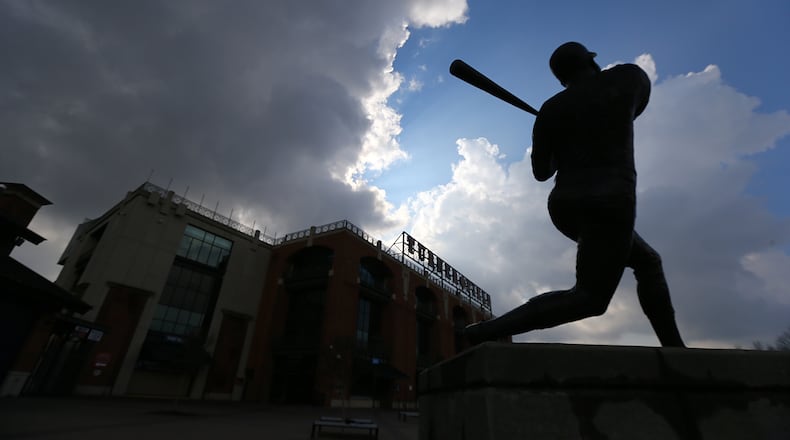Player by player, the Braves are abandoning Turner Field. If the Great Slimming continues apace, by the end of next season the team should be able to make its final exit from the stadium with a single flip of the turnstile.
And yet Atlanta Mayor Kasim Reed thinks the price of the soon-to-be-vacant playing field and 70 surrounding acres may have just jumped. You might call it a case of MGM fever, but there’s more to it than that.
The mayor’s real estate remarks last week were a burst of what might be called premeditated spontaneity.
Politicians generally put great store in the dog-and-pony press conferences they call. The official reason for summoning reporters to City Hall last week was a $40.5 million facelift for Martin Luther King Jr. Drive. The charts were there. The council members were there.
But after the mayoral spiel, not a single journalist wanted to pursue the topic of MLK Drive. And Reed wasn’t a bit displeased.
The mayor ducked an inquiry about Confederate symbolism. And then came the pitch he’d been sitting on: What about Turner Field?
“Since the MGM announcement around the Georgia Dome, we have gotten two to four requests for meetings, to have a conversation about buying the Turner Field parcel,” Reed said. All were from MGM competitors – domestic and international.
Only three days before, news had surfaced that MGM Resorts International, sensing a shift in the state Capitol, is preparing a 2016 push to obtain legislative approval for a $1 billion, Las Vegas-style casino in Atlanta. Sites scouted included the Georgia Dome, Centennial Olympic Park, and the downtown “Gulch.”
With his remarks, Reed effectively expanded the search area. In a reluctant sort of way.
“I’m not there on gaming at all. I believe Las Vegas is in Las Vegas for a reason,” the mayor said. “I just have real issues setting a facility in Atlanta where working folks get off work and walk into a gaming casino.”
And yet to put the kibosh on talks with casino magnates or their representatives would amount to “fiscal malpractice,” he added. “Staggering” numbers were at stake.
Many faults have been assigned to the mayor of Atlanta, but equivocation isn’t one of them. So what’s up?
Well over a year ago, shortly after the Braves announced they would depart for Cobb County, Georgia State University and a private development team led by the Atlanta real estate firm Carter began pitching a $300 million proposal that calls for the conversion of “The Ted” into a football, soccer and track and field stadium.
The firm also wants to develop the surrounding acreage with student housing – plus retail establishments. A first session with local residents was held in June. Things did not go well.
“None of us want to live on frat row,” said one long-time resident.
You might wonder how a neighborhood with an overabundance of laundromats, liquor stores and check-cashing establishments can afford to be picky. But the Summerhill community has been promised stadium rainbows since 1965, when the first Braves home was thrown up on their backs. Residents have little reason to trust developers.
“It’s fair to say that the neighborhood isn’t sold on the idea,” said Carla Smith, the councilwoman who represents the area. “What the future holds, I don’t know.”
The mayor said last week that he would follow the lead of Smith, who has been able to cobble together a community-based study of what might be done with the Turner Field acreage. It won’t be completed until next June.
Reed said he has no doubt that a university would make a better quality-of-life neighbor for Summerhill. “I’ve got to believe for the kids in that neighborhood, it’s probably more inspirational to look onto a college campus with professors and sports and ball fields than to look onto a gaming casino,” the mayor said.
But by holding out a casino alternative, the mayor was encouraging both sides to get down to the business of unicorn-free negotiations. Now, in order to work, a casino threat – no, that's the wrong word – a casino alternative requires credibility. It requires motive.
Fortunately, Gov. Nathan Deal and the Atlanta Hawks have provided. The governor said this week he might let Georgia voters have the final word on casino gambling in a referendum. And the Hawks announced their need for a new or renovated stadium.
Reed has said he’s open to some public funding to keep the basketball team in Atlanta, but where to find the cash? Well, when it comes to Turner Field, the math would tell you that a $1 billion casino deal is bigger than a $300 million GSU-based expansion.
The university, by the way, has yet to produce details of how it would finance its portion of the venture, so Reed’s casino pitch might also be aimed at those who operate the levers of state government, including the Board of Regents.
A gaming facility may be just as threatening to the Gold Dome crowd as to Summerhill. A casino where “The Ted” now sits would be a virtual next-door neighbor to the state Capitol. The optics would be deadly. And surely locating two houses of chance so closely together would violate local land-use restrictions.
About the Author



